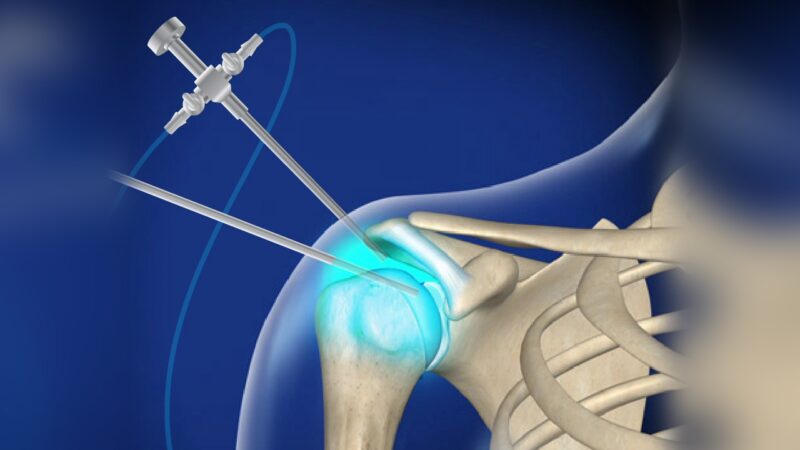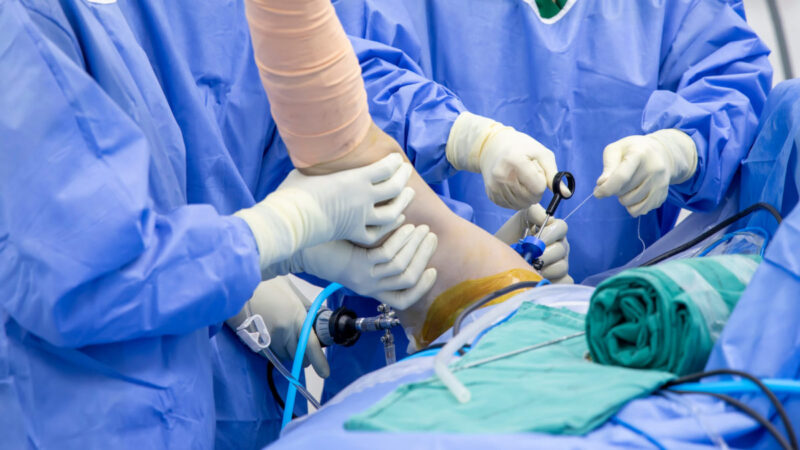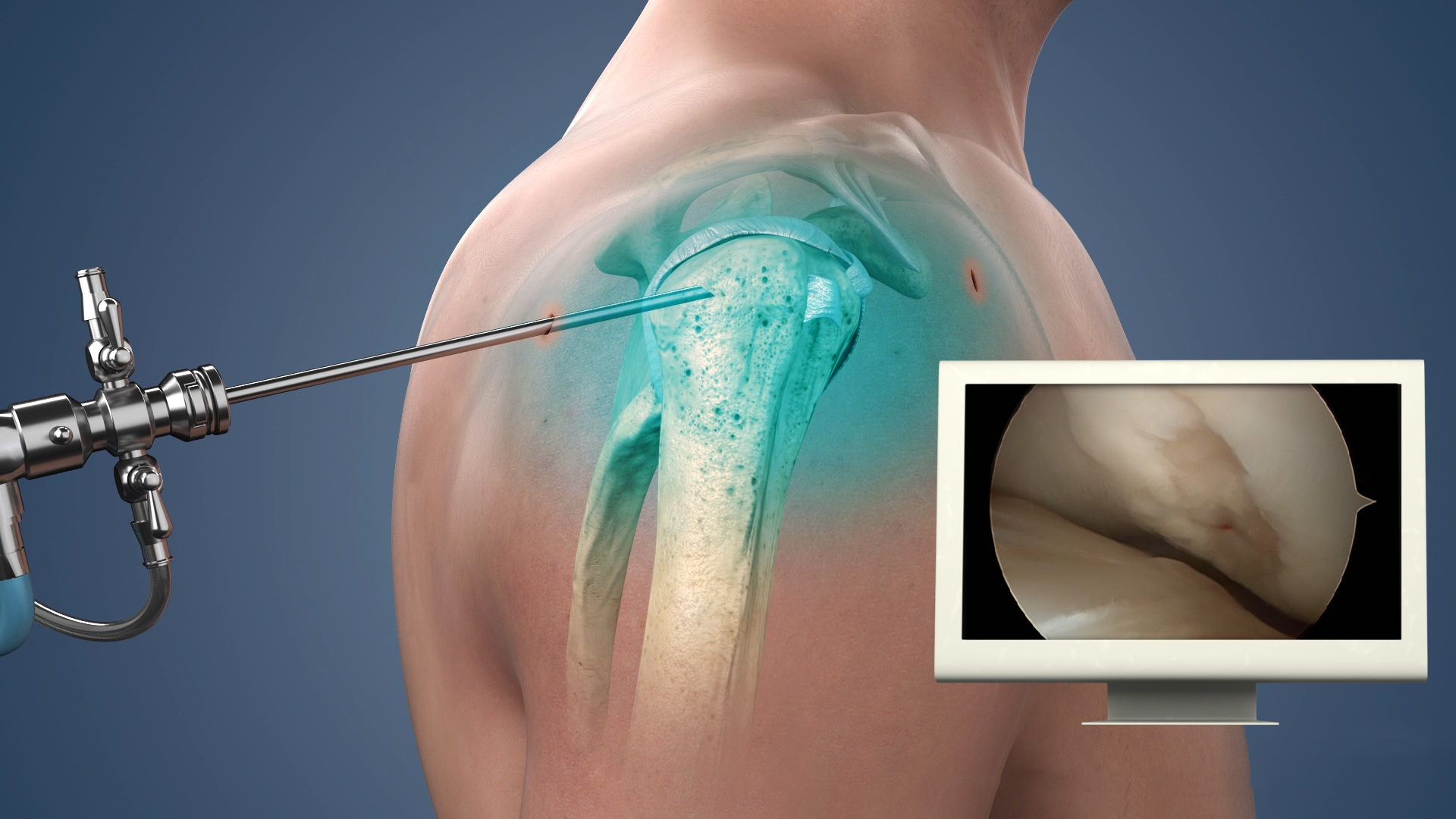Shoulder surgery is a term that refers to the surgical repair of the shoulder joint. Advancements in medical technology have led to an increasing number of procedures being performed to treat these conditions.
This surgery is done when the condition of the shoulder joint and its surrounding tissues has caused inflammation, irritation, or damage. These conditions may create instability in the joint, leading to pain, loss of movement and limited function. This condition can also lead to the development of arthritis.
Types of shoulder surgery?

Total shoulder replacement: Doctors perform this when the shoulder cartilage has worn off and there is no space to move freely. In this procedure, a ball-and-socket joint is created. This joint resembles the one found in the hips. Total shoulder replacement occurs when there is damage to both sides of the joint. This procedure also involves removing nerves from the shoulder and replacing them with prosthetic ones.
Arthroplasty: This involves removing the damaged cartilage of the shoulder and replacing it with a plastic or metal piece that acts as an artificial joint. The procedure requires an incision in the front of the shoulder, which is later stitched up. This type of surgery is recommended when the shoulder joint cartilage is damaged by injury or the wearing-out process of its cartilage.
Arthroscopy for frozen shoulder: A frozen shoulder results in a lot of pain and stiffness in the shoulder joint. It is caused by the thickening of the capsule surrounding the shoulder joint. Arthroscopy for a frozen shoulder involves making small incisions in the front of the shoulder and inserting a camera through it. The surgeon can see the inner structure of the shoulder using this device. To treat the frozen shoulder, sometimes only the damaged area is removed, while other times, the entire joint is replaced with a new one.

Acromioclavicular joint repair for arthritis: This procedure involves removing the damaged or worn-out cartilage of the acromioclavicular joint and replacing it with a plastic or metal piece that acts as an artificial joint. The process requires an incision in the front and back of the shoulder, which is later stitched up.
Arthroscopy for impingement syndrome: Shoulder impingement surgery is designed to remove pressure from the rotator cuff tendon or sometimes the shoulder bursa with the particular aim of relieving pain and allowing the shoulder to retain normal function.
Rotator cuff repair: This is a surgical procedure done on people who experience tears in the shoulder’s tendons, muscles, or ligaments. The rotator cuff is made up of 4 tendons and two muscles that are held in place by tissues that surround it. Tearing of any one of these tissues may lead to pain and loss of movement of the shoulder. People can avoid this by getting rotator cuff repair surgery by repairing the torn tissues using sutures or pieces of cadaver tendons. This treatment is recommended when tearing is caused by injury or wearing out of the tendons, muscles, and ligaments.
Procedures performed in addition to soldier surgery.
Bone fracture or dislocation repair involves removing the loose piece of bone and replacing it with a new one. This is done when the bone breaks during an injury and may lead to pain, inability to move the arm, or deformity after repair.
Bursectomy or bursa sac repair: This surgery involves removing the bursa sac made up of fat and fluid. It helps prevent pain, numbness in the arm, and swelling after an injury.
Ligament reconstruction or repair: This refers to replacing a torn ligament by repairing it using sutures. Doctors do this to prevent pain and loss of movement of the shoulder.
Removal of scar tissue: Injuries or surgeries can lead to scar tissue formation, which can limit movements and cause pain. Undergoing surgery to remove the scar tissue is recommended in such cases.
Why do surgeons perform shoulder surgery?

Shoulder surgery is performed to prevent pain and get you back to doing the activities that you love. The procedure can also be used for correcting the deformities of the shoulder. However, if you undergo such surgery, you must adhere to specific post-operative instructions under which your recovery will be monitored.
What are the complications of shoulder surgery?
Several risks are associated with shoulder surgery but are not very high. The main complication that can occur is a procedure failure, which involves nerve damage. Other possible complications include infection, nerve injury, and blood clots. These conditions may cause you to lose movement or pain in the shoulder joint.
How is shoulder surgery performed?

Shoulder surgery generally involves the following:
- Minimally invasive surgery: This type of surgery is done using small incisions, which are not very deep. It reduces muscle trauma, pain, and scarring.
- Mini-open surgery: This is also known as mini-arthroscope surgery. It involves making a small incision and inserting a camera to see the inside of the shoulder.
- Open surgery: This type of surgery involves making larger incisions in the shoulder to see the damage and treat it.
What can I expect after my shoulder surgery?
The surgery will leave you with scars. The surgeon will explain the type of scar and its location to help ensure that it is hidden under your clothes. It is also possible to wear a t-shirt or strapless bra after surgery. The incisions will be covered with dressing and bandages. You will have to follow the post-operative instructions of your surgeon carefully to reduce your chances of complications.
You will be given painkillers and anti-inflammatory medications to relieve pain after shoulder surgery. Doctors may also hand you various instructions on handling your wounds at home. You will be required to visit the physical therapist for rehabilitation.
How long does recovery take after shoulder surgery?
The recovery period after shoulder surgery differs for different people and depends on various factors, such as the severity of your condition and individual circumstances. The recovery period may last for weeks and even months.
In conclusion, shoulder surgery is the best treatment option for those with painful, frozen, or injured shoulders. The surgeon will consider the type of symptoms you are suffering from and recommend the most suitable treatment option.

